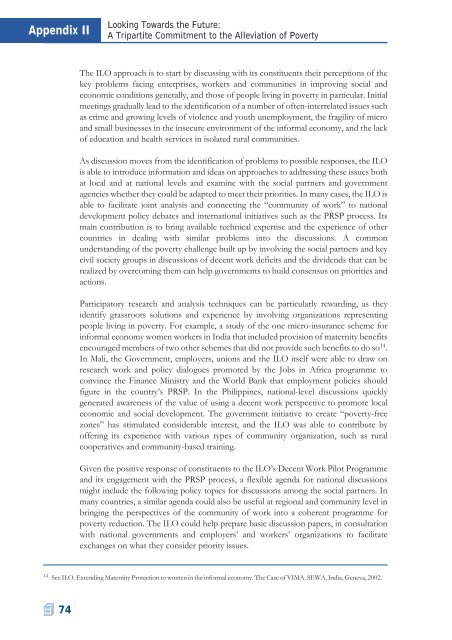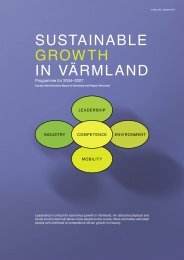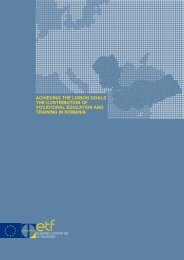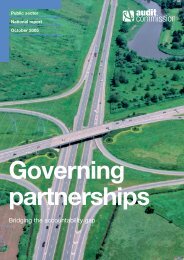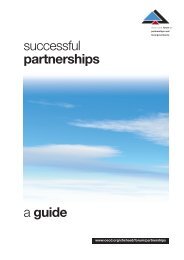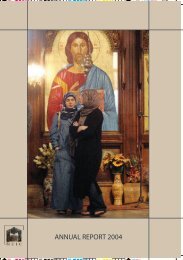PDF (345 KB ) - Document Database website
PDF (345 KB ) - Document Database website
PDF (345 KB ) - Document Database website
You also want an ePaper? Increase the reach of your titles
YUMPU automatically turns print PDFs into web optimized ePapers that Google loves.
Appendix II<br />
Looking Towards the Future:<br />
A Tripartite Commitment to the Alleviation of Poverty<br />
The ILO approach is to start by discussing with its constituents their perceptions of the<br />
key problems facing enterprises, workers and communities in improving social and<br />
economic conditions generally, and those of people living in poverty in particular. Initial<br />
meetings gradually lead to the identification of a number of often-interrelated issues such<br />
as crime and growing levels of violence and youth unemployment, the fragility of micro<br />
and small businesses in the insecure environment of the informal economy, and the lack<br />
of education and health services in isolated rural communities.<br />
As discussion moves from the identification of problems to possible responses, the ILO<br />
is able to introduce information and ideas on approaches to addressing these issues both<br />
at local and at national levels and examine with the social partners and government<br />
agencies whether they could be adapted to meet their priorities. In many cases, the ILO is<br />
able to facilitate joint analysis and connecting the “community of work” to national<br />
development policy debates and international initiatives such as the PRSP process. Its<br />
main contribution is to bring available technical expertise and the experience of other<br />
countries in dealing with similar problems into the discussions. A common<br />
understanding of the poverty challenge built up by involving the social partners and key<br />
civil society groups in discussions of decent work deficits and the dividends that can be<br />
realized by overcoming them can help governments to build consensus on priorities and<br />
actions.<br />
Participatory research and analysis techniques can be particularly rewarding, as they<br />
identify grassroots solutions and experience by involving organizations representing<br />
people living in poverty. For example, a study of the one micro-insurance scheme for<br />
informal economy women workers in India that included provision of maternity benefits<br />
encouraged members of two other schemes that did not provide such benefits to do so 14 .<br />
In Mali, the Government, employers, unions and the ILO itself were able to draw on<br />
research work and policy dialogues promoted by the Jobs in Africa programme to<br />
convince the Finance Ministry and the World Bank that employment policies should<br />
figure in the country’s PRSP. In the Philippines, national-level discussions quickly<br />
generated awareness of the value of using a decent work perspective to promote local<br />
economic and social development. The government initiative to create “poverty-free<br />
zones” has stimulated considerable interest, and the ILO was able to contribute by<br />
offering its experience with various types of community organization, such as rural<br />
cooperatives and community-based training.<br />
Given the positive response of constituents to the ILO’s Decent Work Pilot Programme<br />
and its engagement with the PRSP process, a flexible agenda for national discussions<br />
might include the following policy topics for discussions among the social partners. In<br />
many countries, a similar agenda could also be useful at regional and community level in<br />
bringing the perspectives of the community of work into a coherent programme for<br />
poverty reduction. The ILO could help prepare basic discussion papers, in consultation<br />
with national governments and employers’ and workers’ organizations to facilitate<br />
exchanges on what they consider priority issues.<br />
14 See ILO. Extending Maternity Protection to women in the informal economy. The Case of VIMA. SEWA, India, Geneva, 2002.<br />
74


